#for anyone who's interested
Explore tagged Tumblr posts
Text

Decorative Over the Garden Wall pillows!
#over the garden wall#embroidery#hand embroidery#applique#sewing#otgw greg#otgw wirt#otgw beatrice#otgw frog#otgw fanart#otgw#I will reblog this post#with more construction details#for anyone who's interested#artists on tumblr#artists of tumblr#crafters of tumblr#craftblr#crafting#my post
43 notes
·
View notes
Text
The 1959 TV series 21 Beacon Street will be released on DVD soon (June 27, 2023) and is currently available for pre-order. (I think they only ship within the US though...)
DeForest Kelley plays a character named George Manning in episode 9 - The Hostage. I don't know how big/small his part actually is or what the quality will be on these but it's a De role I haven't seen before.
The episode description on IMDB:
A gang decides to steal the receipts of a mail order and decide to target the head cashier George Manning. The hoodlums kidnap his wife Lois promising to release her when George hands over the cash.
#deforest kelley#21 beacon street#classicflix#my posts#for anyone who's interested#if they shipped internationally i might have actually bought this
13 notes
·
View notes
Text
@missthirsty is a side blog for me to share my undying love for Sejanus Plinth (and whoever comes in the future).
I haven't seen the movie yet but I know lots of spoilers + have seen most scenes that include Sej.
It's a non-dark blog
3 notes
·
View notes
Text

#For anyone who's interested#Only girl groups cause I don't listen to boy groups enough to have strong opinions#Also most of the songs in D tier just make me irrationally angry for no reason#Sorry to fromis 😭#Also I would probably move Hurt by NewJeans to B or C#Cause I have to be in the mood
2 notes
·
View notes
Text
im so serious if you cant imagine a single female character u like or you coincidentally only care about men or imagine that women are a different species of human that are impossible to draw or write about or relate to, You are the problem. its not because you’re gay it’s because you do not like women
#There is not a Feminist Quota about how the evil feminists are going to FORCE you to think about any media you like#but some of you guys are just fucking misogynistic im sorry.#anyone who thinks fugo is the most deep and interesting character in p5 but hates trish for being boring owes me genuine real life money
14K notes
·
View notes
Text
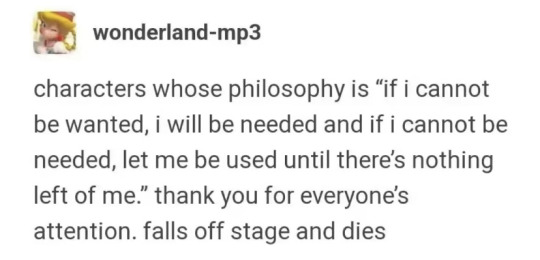
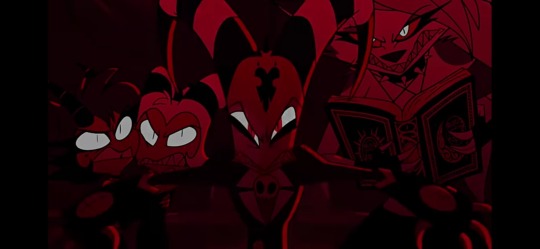
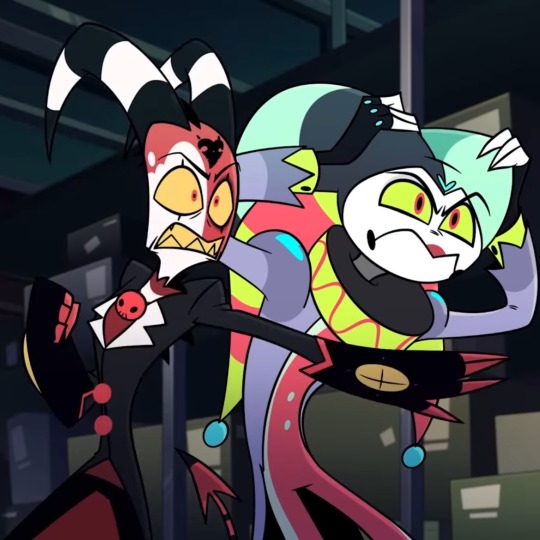
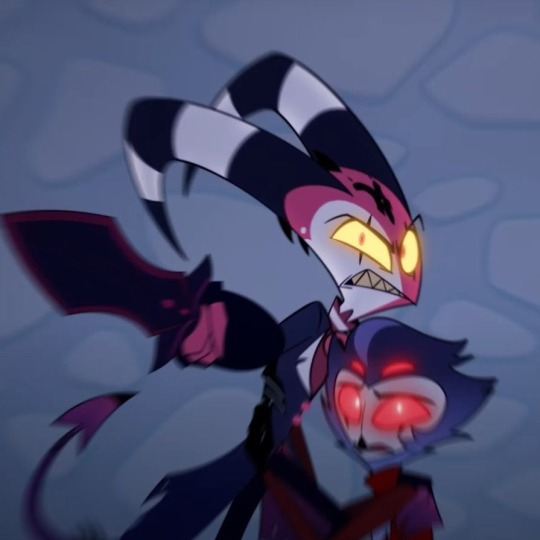
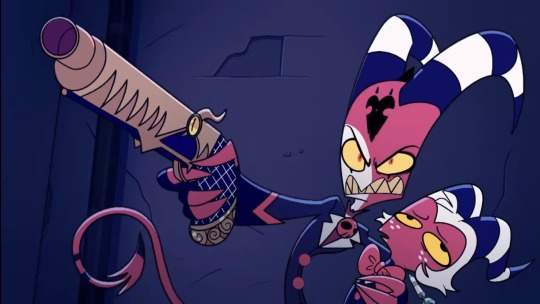
Blitzøs entire life spent being unwanted. So he adapted, and learned how to be something needed, something to be used.
Which is why I think he firmly believes he is being used by Stolas. He simply cannot fathom a different reality, one in which he is wanted for once in his life.
#if you get it you get it#I don’t understand how Blitzo haters don’t get it#he’s complex and he fucks up but it’s because he cannot fathom being genuinely wanted and loved by someone#since he has never felt genuinely loved or wanted#and the few people who maybe made him feel that way#he ruined their lives#I’m writing a fanfic currently with this concept if anyone’s interested lmao#stolitz#helluva boss#stolas#blitzo#hellaverse#helluva blitzo#helluva boss blitz#helluva boss trailer#blitzo x stolas#hazbin hotel#imp#imp helluva boss#blitzo buckzo#protective blitz#protective blitzo
9K notes
·
View notes
Text

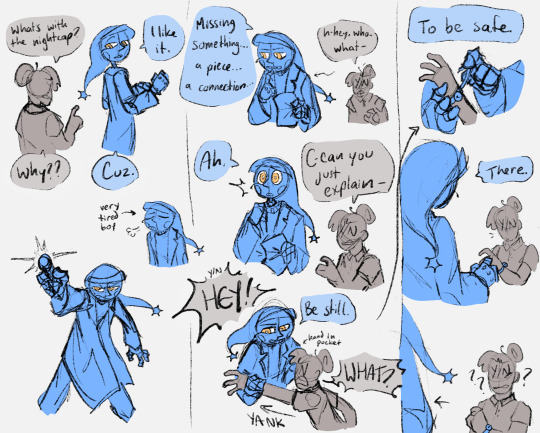

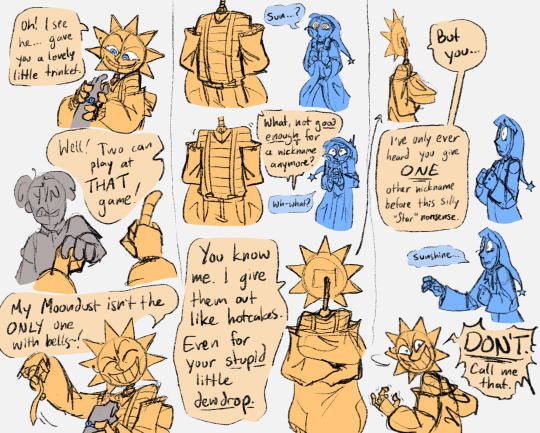
dca who (doctor who) au!!! it’s happening!! sound the alarms!!!
Sun comes much later in the au once y/n and Moon become closer… but i couldn’t just NOT draw him :)
#fnaf#fnaf sb#fnaf dca#dca fandom#fnaf sun#fnaf moon#dca y/n#dca who au#doodle dump#so so sososo consumed by the Thoughts of Moon and Sun’s relationship in this au…. rgfhghhhhh#bonus detail!! for the special lot who read the tags: isn’t it interesting how Moon’s colors are dull and Sun’s are nice and bright? hm…#extra detail because i can’t keep it in. i chose all the nicknames VERY specifically. names have meanings after all#still iffy on y/n’s fashion. if anyone has suggestions (other than the combat boots. they’re keeping those) lemme know!
2K notes
·
View notes
Text
also in regards to that last article about varied ways of thinking about psychosis/altered states that don't just align with medical model or carceral psychiatry---I always love sharing about Bethel House and their practices of peer support for schizophrenia that are founded on something called tojisha kenkyu, but I don't see it mentioned as often as things like HVN and Soteria House.

ID: [A colorful digital drawing of a group of people having a meeting inside a house while it snows outside.]
"What really set the stage for tōjisha-kenkyū were two social movements started by those with disabilities. In the 1950s, a new disability movement was burgeoning in Japan, but it wasn’t until the 1970s that those with physical disabilities, such as cerebral palsy, began to advocate for themselves more actively as tōjisha. For those in this movement, their disability is visible. They know where their discomfort comes from, why they are discriminated against, and in what ways they need society to change. Their movement had a clear sense of purpose: make society accommodate the needs of people with disabilities. Around the same time, during the 1970s, a second movement was started by those with mental health issues, such as addiction (particularly alcohol misuse) and schizophrenia. Their disabilities are not always visible. People in this second movement may not have always known they had a disability and, even after they identify their problems, they may remain uncertain about the nature of their disability. Unlike those with physical and visible disabilities, this second group of tōjisha were not always sure how to advocate for themselves as members of society. They didn’t know what they wanted and needed from society. This knowing required new kinds of self-knowledge.
As the story goes, tōjisha-kenkyū emerged in the Japanese fishing town of Urakawa in southern Hokkaido in the early 2000s. It began in the 1980s when locals who had been diagnosed with psychiatric disorders created a peer-support group in a run-down church, which was renamed ‘Bethel House’. The establishment of Bethel House (or just Bethel) was also aided by the maverick psychiatrist Toshiaki Kawamura and an innovative social worker named Ikuyoshi Mukaiyachi. From the start, Bethel embodied the experimental spirit that followed the ‘antipsychiatry’ movement in Japan, which proposed ideas for how psychiatry might be done differently, without relying only on diagnostic manuals and experts. But finding new methods was incredibly difficult and, in the early days of Bethel, both staff and members often struggled with a recurring problem: how is it possible to get beyond traditional psychiatric treatments when someone is still being tormented by their disabling symptoms? Tōjisha-kenkyū was born directly out of a desperate search for answers.
In the early 2000s, one of Bethel’s members with schizophrenia was struggling to understand who he was and why he acted the way he did. This struggle had become urgent after he had set his own home on fire in a fit of anger. In the aftermath, he was overwhelmed and desperate. At his wits’ end about how to help, Mukaiyachi asked him if perhaps he wanted to kenkyū (to ‘study’ or ‘research’) himself so he could understand his problems and find a better way to cope with his illness. Apparently, the term ‘kenkyū’ had an immediate appeal, and others at Bethel began to adopt it, too – especially those with serious mental health problems who were constantly urged to think about (and apologise) for who they were and how they behaved. Instead of being passive ‘patients’ who felt they needed to keep their heads down and be ashamed for acting differently, they could now become active ‘researchers’ of their own ailments. Tōjisha-kenkyū allowed these people to deny labels such as ‘victim’, ‘patient’ or ‘minority’, and to reclaim their agency.
Tōjisha-kenkyū is based on a simple idea. Humans have long shared their troubles so that others can empathise and offer wisdom about how to solve problems. Yet the experience of mental illness is often accompanied by an absence of collective sharing and problem-solving. Mental health issues are treated like shameful secrets that must be hidden, remain unspoken, and dealt with in private. This creates confused and lonely people, who can only be ‘saved’ by the top-down knowledge of expert psychiatrists. Tōjisha-kenkyū simply encourages people to ‘study’ their own problems, and to investigate patterns and solutions in the writing and testimonies of fellow tōjisha.
Self-reflection is at the heart of this practice. Tōjisha-kenkyū incorporates various forms of reflection developed in clinical methods, such as social skills training and cognitive behavioural therapy, but the reflections of a tōjisha don’t begin and end at the individual. Instead, self-reflection is always shared, becoming a form of knowledge that can be communally reflected upon and improved. At Bethel House, members found it liberating that they could define themselves as ‘producers’ of a new form of knowledge, just like the doctors and scientists who diagnosed and studied them in hospital wards. The experiential knowledge of Bethel members now forms the basis of an open and shared public domain of collective knowledge about mental health, one distributed through books, newspaper articles, documentaries and social media.
Tōjisha-kenkyū quickly caught on, making Bethel House a site of pilgrimage for those seeking alternatives to traditional psychiatry. Eventually, a café was opened, public lectures and events were held, and even merchandise (including T-shirts depicting members’ hallucinations) was sold to help support the project. Bethel won further fame when their ‘Hallucination and Delusion Grand Prix’ was aired on national television in Japan. At these events, people in Urakawa are invited to listen and laugh alongside Bethel members who share stories of their hallucinations and delusions. Afterwards, the audience votes to decide who should win first prize for the most hilarious or moving account. One previous winner told a story about a failed journey into the mountains to ride a UFO and ‘save the world’ (it failed because other Bethel members convinced him he needed a licence to ride a UFO, which he didn’t have). Another winner told a story about living in a public restroom at a train station for four days to respect the orders of an auditory hallucination. Tōjisha-kenkyū received further interest, in and outside Japan, when the American anthropologist Karen Nakamura wrote A Disability of the Soul: An Ethnography of Schizophrenia and Mental Illness in Contemporary Japan (2013), a detailed and moving account of life at Bethel House. "
-Japan's Radical Alternative to Psychiatric Diagnosis by Satsuki Ayaya and Junko Kitanaka
#personal#psych abolition#mad liberation#psychosis#altered states#antipsych#antipsychiatry#mad pride#peer support#schizophrenia#i have a pdf of the book somewhere if anyone wants#the book and the documentary also discuss some of the pratical struggles in creating a community like this which i also found helpful as#someone who is very interested in helping open a peer respite.
2K notes
·
View notes
Text
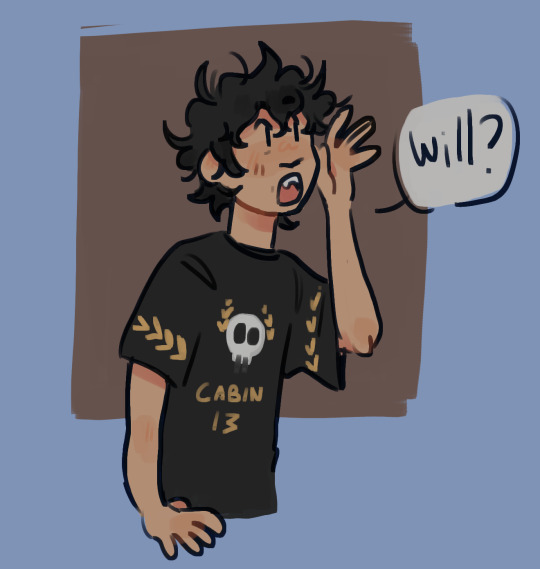

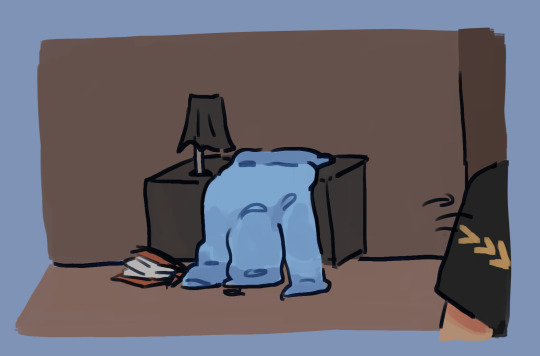
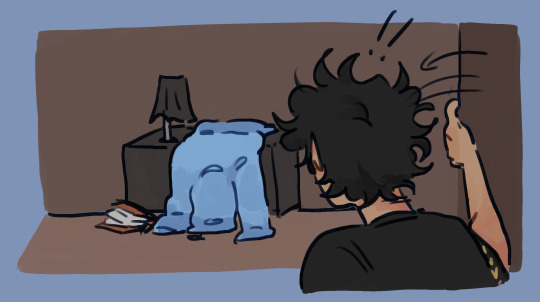

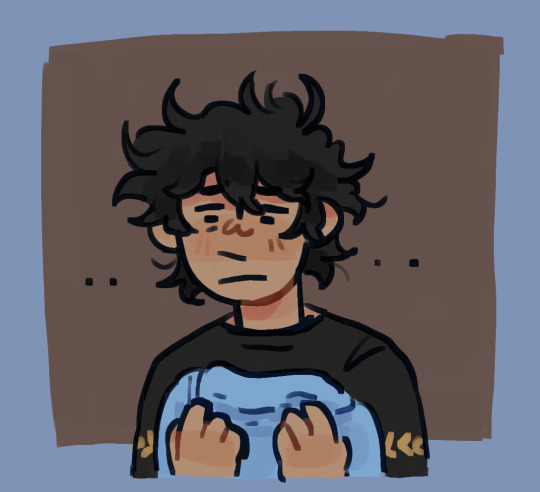

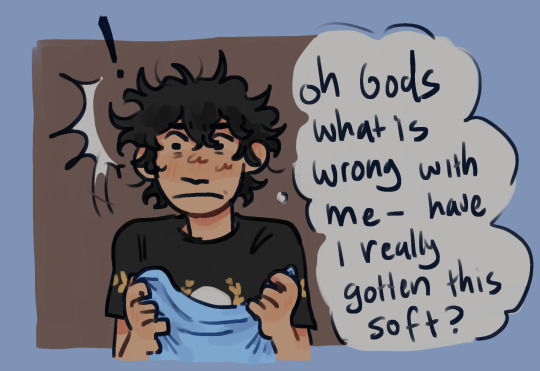

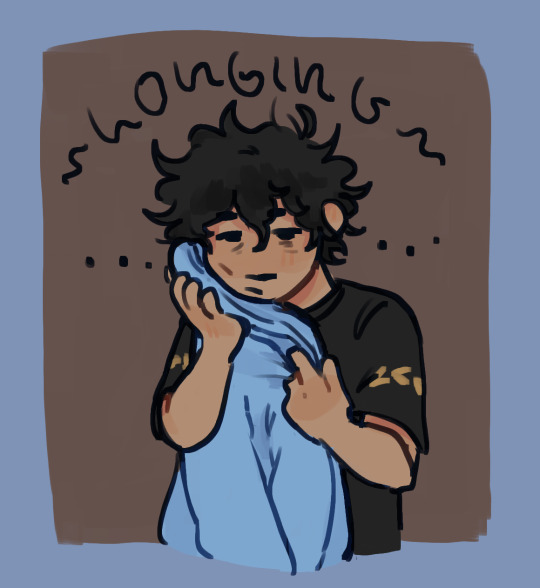
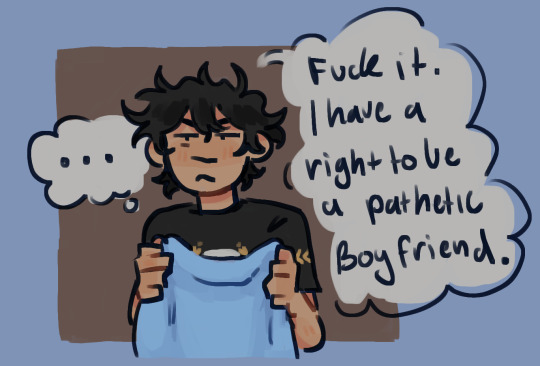


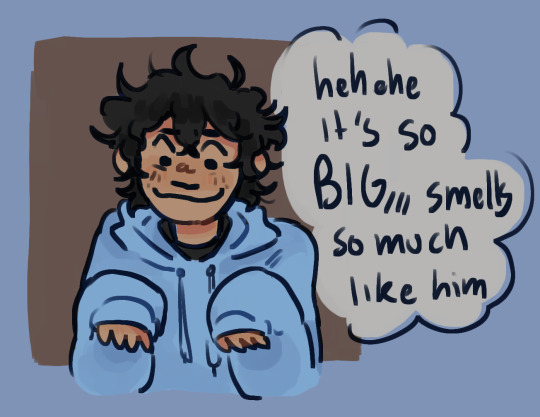
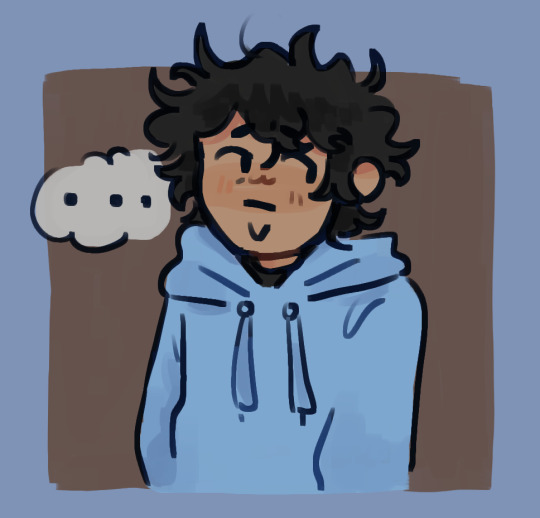

thinking about Nico adjusting to letting himself miss and long for the people he loves. based on these bits from the sun and the star:
" As Nico and Will followed the trogs, he thought about how much he missed Hazel. He was learning to make peace with that feeling. It was okay for him to miss people because that meant he wanted them around in his life. That idea was *very* new for him- he was used to either pushing people away or watching them recoil from his presence." *
" That was the most surreal thing of all... Was he happy? Nico wasn't very familiar with the sensation, but he couldn't deny that he felt wonderful in Will's presence. He even longed for the son of Apollo when they were apart. A funny thing had happened as the two grew closer: Nico suddenly understood all those cheesy, sappy love songs he'd always hated."
#its just. i like that they included that in the book yk. the fact that he prepared a certain distance between everyone#and thus isnt used to missing anyone#so its strange for him#this is probably set somewhere pre tsats just because i like to think it was one of the times he found himself missing and longing.#but it was one of the first times he actually allowed himself to feel that way.#took the feeling and held it instead of banishing it away#also yes letting himself unmask a bit#i like to think he just gets wayyy more expressive with his hands the more he heals#that and he unmasks more!!! more openly stimming!! more special interest rambles!!#just oughh.#anyways this was a huge comic to colour#big fuck you to tumblr who made posting soooo much harder#fuck u and ur updates tumblr#solangelo#pjo#percy jackson and the olympians#percy jackon and the olympians#nico di angelo#will solace#the sun and the star#trials of apollo#they borrow clothes from eachother its real in my head okay#nico canonally bought will a stupid shirt as a joke tho and i love that for them
5K notes
·
View notes
Text
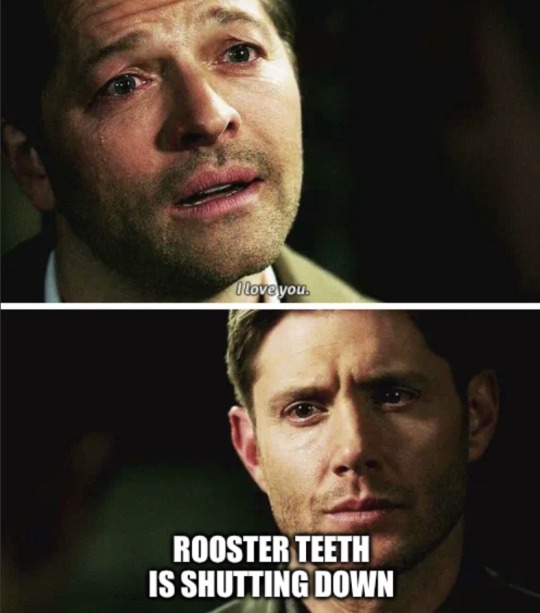
well….it finally happened
#rip rt#the good times were certainly good <3#rt#roosterteeth#rooster teeth#honestly this is how i’m finding out it was officialy rooster teeth and not one word#if anyone doesn’t read the article but reads my tags (??) it looks like only the podcasts are carrying on for the time being#they’re shopping around rwby and shows like that and the roost which is the podcast side of things but otherwise#also apparently there’ll be a stream on the rt site tomorrow talking about it if anyone is interested#idk this sucks#be good to the people who were still there they deserve it#warner media on the other hand…..rot <3
4K notes
·
View notes
Text

#slay the princess#I know this is out of nowhere but-#Sorry someone just sent me a crazy take and this is the only way to cope.#Reminder! The devs themselves said that they see all endings as canon!#Do not send authors messages if their fic/interpretation/posts did not align with your canon!#Fun fact! I only became interested in this game *because* the devs said that#So people saying that that interpretation is wrong… kind of rub me the wring way.#So just to confirm:#Saying you interpreted the game's relationship as romantic and healthy: Cool#Saying anyone who interprets the game any other way is wrong: Not Cool#meme
2K notes
·
View notes
Text
Who Is Scout's Ma?
She's a character we know extremely little about, however when you stop to consider the IMPLICATIONS of what little we DO know, things start to get interesting:
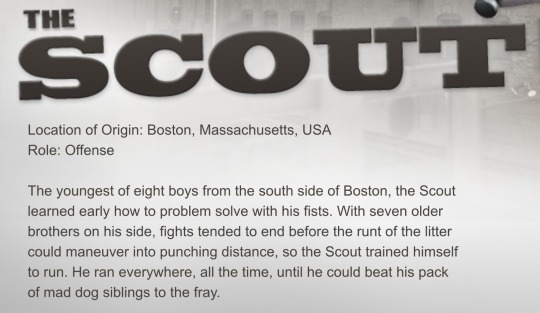
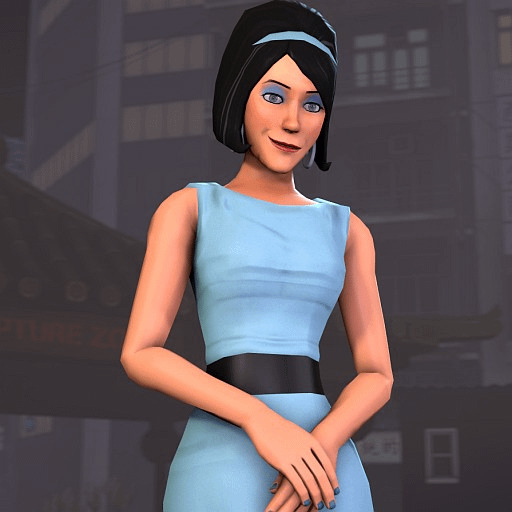
1. She lives in the roughest part of Boston ("if you were from where I was from, you'd be dead") but dresses quite elegantly.
2. She had 8 boys, all of whom she raised BY HERSELF, and yet somehow she finds the time to maintain this impeccable appearance.
3. Scout clearly loves and admires her to a point where it's one of the few things he'll drop his "tough guy" act for, and dialogue in the comics like "Ma's gonna kill me if she finds out" implies he also still fears her disapproval, despite being a fully autonomous adult.
4. Spy, despite what he likes to pretend, is clearly head-over-heels for her. He even had her likeness engraved on his fanciest gun! (Note the distinct hairband & hoop earrings) For a man who avoids attachment to the point where he never lets anyone see his face, that's an unusual degree of infatuation.

5. None of Scout's brothers left Boston while he was growing up, despite a few of them presumably being adults by then. Not only this, they were still all getting into fights together, implying they were both continuing to live with or near their mother and brothers, AND had reasons to brawl with others beyond just some adolescent street scuffle.
My Theory:
Scout's Ma is the matriarch of a Boston-based crime family.
It explains her elegant appearance, how she and Spy were able to meet, why their bond clearly goes beyond a one-off fling, why she was able to be in Scout's life so much despite the financial burdens of being a single mother of 8, and why all of said 8 were continuing to get into fights with other locals. They weren't just some street gang, they were enforcers. It also explains why/how Scout got into mercenary work, his many mafia-themed weapons, and why he continues to fear her ire even as an adult.
Plus, take a look at this unused angle of the last photo from Meet The Spy:

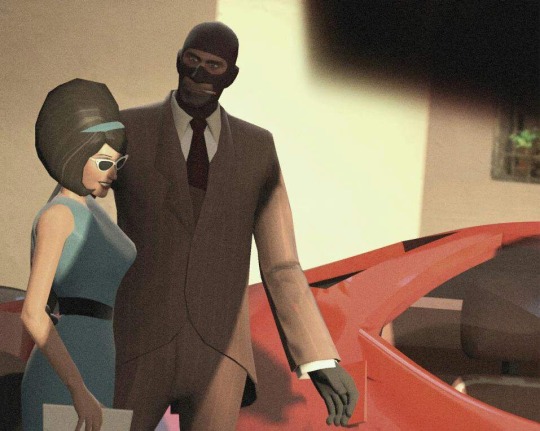
You'd THINK a single mother from the rough side of Boston wouldn't appear so in-her-element on a fancy date with The Spy, and yet her appearance and demeanour here just SCREAM "confident and in control."
Scout's Ma is Boston's Godmother, and I desperately wish to see someone draw her as such.
#Spy's continued love for her is what REALLY makes me think 'crime boss'#For Spy to fall for someone#he'd need to consider them an equal who shares his interests#in other words she'd need to be just as 'dangerous' as him#If anyone can provide a better explanation#Id love to hear it!#tf2#team fortress 2#headcanon#tf2 headcanons#tf2 theory#scout tf2#tf2 scout#the scout#the spy#spy tf2#tf2 spy#scout's ma#scout's mom#tf2 scout's ma#tf2 scout's mom#argh why are there so many different tags??#spy x scout's ma
2K notes
·
View notes
Text
"Is it true that you and Harrington are friends now?"
Steve paused outside the drama class' door and lowered the hand that was about to push it open. He didn't expect to eavesdrop when he came back to retrieve his jacket, but he decided to make an exception because those people were clearly talking about him behind his back even when it was in the form of drilling Eddie about their sudden friendship.
And Eddie's friends were right to be suspicious about it. Because had it not been for the Upside Down, the two of them wouldn't have become close at all. Or maybe, they would eventually with their shared custody of the kids. But he was well aware that Eddie was too cool to be seen with a failure like Steve Harrington.
Without the shared traumas, they had nothing in common. And sometimes, he thought Eddie only saw him as an inconvenient cousin that he hated but had to tolerate for the sake of their family.
It hurt to think like that, but every time Eddie blushed and stammered in embarrassment when someone asked about him, Steve couldn't help but believe it was true.
So now, he wanted to know what Eddie's answer would be without him there. If Eddie had been genuine about being his friend this whole time or if Eddie would scoff and prove his worst fear right.
"Yeah, Eddie, what's the deal with Harrington? Has he been bothering you or something?"
Steve grimaced. Had he been such a douche in high school that everyone would always assume the worst of him even now?
"Nah, he's really sweet once you get to know him," Eddie chuckled, sounding fond and warm. "He's a good guy. And the world's best mom, apparently. Like I already knew our sheepies worship the ground he walks on, but I only understood why it's clearly a given when I finally met him. He's just... incredible, man."
Steve's cheeks burned at the transparent affection in Eddie's voice. He could see the way Eddie pulled a strand of hair to hide his blush behind it. God, he was a bad friend for doubting Eddie in the first place.
"Gross, you sound lovesick, dude."
"That's homophobic, man."
"You know what I mean. So it's true that you're friends with Harrington."
There was a pause and Steve felt his stomach roll with nerve. Despite having known where Eddie's loyalty lied, he still waited with bated breath.
"We're boyfriends, actually," Eddie said calmly.
As the others erupted in surprised noises, Steve blinked owlishly and walked away, forgetting about his jacket. He had so many questions right now, but first:
When did he and Eddie start dating?
#steddie#steve harrington#eddie munson#oblivious steve harrington#steve wondered why no one seemed interested in him anymore#he didn't know eddie had been going around telling people they were dating this whole time#and would threaten anyone who dared to flirt with him#steve: and when did i agree to go out with you?#eddie: i asked you if you wanna be kidnapped by me and you said yes?#sionewrites
2K notes
·
View notes
Text

I'm on chpt20 and I want to study SQQ like a bug. My man is flushed, hair down, robes literally falling off his shoulders, LBH on his lap playing with his hair and kissing him... and he finally cottons on to the fact that maybe this isn't how you have a platonic and important discussion. Enforces it for all of five seconds at which point LBH starts massaging his waist and SQQ is back to being like "yeah this is fine and normal". Amazing. Can't believe he insults the IQ of SQH's characters.
#Shen 'the pot' Qingqiu meet Shang 'the kettle' Qinghua - fucking morons#svsss#shen qingqiu#luo binghe#bingqiu#sqq#lbh#honestly thought i'd be finishing bk3 today i was so ready to devour the last hundred pages after work today#and then i slammed face first into this mental image and was completely derailed#mxtx you can't keep being the funniest mfer out there it makes it so hard to read without needing to stop and draw#i seriously cannot BELIEVE this#this would not be a slowburn for anyone OTHER than sqq i'm so angry#i read the bit where lbh is so overwhelmed he buries his face into sqq's lapels and had a moment of#''gee that's so cute i may need to stop and draw this... NO BE STRONG KEEP READING this is cute but the conversation is#too interesting to stop now!!'' i said with all the naivety of someone who doesn't realize how ridiculous sqq is about to become#Bene Finish This Book Tomorrow Without Being Derailed Challenge#my art#i know in my picture lbh is not massaging his waist but the visual shorthand didn't translate quite as easily as a shoulder massage#for silly cartoony pictures like this broad strokes tend to work better than strict accuracy... hence the paraphrasing :P
920 notes
·
View notes
Text
Sobbing uncontrollably reading through a dissertation about the college experience of students with ADHD. It is like reading a report about my life that just says over and over "My experiences are real. My hardships are real. I am not lazy, I am not dumb. My struggles were not my fault, and they were not a moral failing. The failure was with the system, not with me."
Here's a line that got me in particular:
"Hotez et al.(2022) compared the health, academic, and non-academic capacities of a nationally representative sample of U.S. first-year college students with ADHD and without ADHD. Students with ADHD self-reported lower academic aspirations and more feelings of depression and overwhelm, ranking themselves lower in their general emotional health. The fact that students with ADHD scored in the highest 10th percentile for many non-academic traits, such as artistic ability, computer skills, creativity, public speaking, social confidence, self-understanding and understanding of others, compassion, and risk-tasking, suggests that this population has strengths that are frequently underappreciated in academia."
(the paper is a thesis called "Understanding the Collegiate Experience for Students With ADHD" by Gia Long, 2022)
#adhd#actually adhd#i often hyperbolize but i am dead serious when i say sobbing uncontrollably. this is why i was putting off this assignment.#1000 years of hell to professors who assign self-reflection papers /hj#i dont feel comfy posting the pdf bc its not mine butttt.. i will share it to people who dm me.#edit: pages 80-85#edit: thank you to everyone who reached out and asked for the pdf!! i wasn’t expecting this reaction#keep reaching out I’ll keep sending it#if anyone is interested but struggles to read academic papers pls ask me for help bc I’ve gotten a lot of practice with them and am Glad to#expand someone’s access to a paper like this
4K notes
·
View notes
